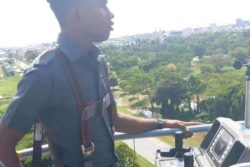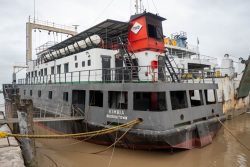Dear Editor,
The place of Jagan and Burnham is secure in the Guyana firmament. Just like Nehru in India, Nasser in Egypt, and Mandela in South Africa, their role can never be eclipsed. True, someone can arise that is intrinsically greater, but the unique context of the earlier times can never be equalled or duplicated. And it is context here that makes the man.
Yet, in the Jagan-Burnham era, to me the true hero is Walter Rodney. Let us not forget that both Jagan and Burnham lived full lives (by Guyana standards), died natural deaths – indeed, died while in office – and were accorded celebrity head-of-state interment. Cuba (Che Guevara) and India (Gandhi) offer precedents where the martyred leaders who did not hold office are regarded as the real national heroes of those countries.
The allusion to Rodney’s political naïvete (attributed to CLR James and Fred Wills) does not detract from the greatness. I, too, used to wonder about that condition. For example, if Walter could not take a phone call, I hardly think he was capable of telling a member of his family to tell the caller he was not at home or in the shower or out of the house. Even such a little white lie! This is the kind of person who is fighting Burnham? I sometimes asked myself.
For the sake of comparison, consider another academic person on the scene at the time, Sociology lecturer, Mohamed Insanally. His short-lived underground movement, The Guyana National Liberation Front (GNLF) was truly prepared to do anything, even to work with and take orders from the CIA. I thought Burnham had his match here, except that Insanally lacked the experience in matters of this kind. To be prepared to die, as Insanally certainly was, was not enough. Courage for sure, but naïvete as well.
The man who is believed to be instrumentally responsible for the murder of Rodney, Gregory Smith, presented himself as a disgruntled GDF employee who wanted to make amends for his sins. Walter saw him as a lost brother seeking redemption. Walter embraced him with his life – literally. But it is exactly this purity, this trusting, and this belief in the fundamental goodness of man that made Rodney such a draw in such a time – massive corruption at the highest levels.
Accomplished politicians, like prize-winning salesmen, or successful Wall Street investment types tend to be less of what Martin Carter called valid human beings. Walter was not your usual political animal. Even the eloquence of Rodney was different. No fire and brimstone that assumed a victor at one end and a vanquished at the other end. At one of the many meetings at D’Urban Street and Louisa Row a black guy expressed all the hopes Walter gave us when he jumped up into the air and shouted, “Rap on, my brother, Oh God, Rap on.” In a speech at the University of Guyana, Walter achieved what is known in cricket as a hat-trick. First trick: he related the story of a corrupt African leader attempting to bribe investigators with the same loot he had stolen. As a hiding place to stash the cash away the man had chosen his refrigerator. (Mild laughter from the audience.). Second trick: “Do you know why he hid the money in the refrigerator?” Walter asked and waited for a moment. Then he answered his own question: “Because the money was hot!” (Wild laughter from the audience.) Third trick: We were about to get back on track with the lecture, and Walter dropped this one: “Don’t be surprised if you accidentally open some refrigerators here in Georgetown and money pours out.” (Talk about bringing down the house, the laughter became hysterical.) Yes, it was not only struggle, there was fun and camaraderie that you can never forget.
Others have correctly pointed out that Rodney and the WPA had unbelievably large attendances at public meetings. I understand that the PPP leader became particularly concerned at the attendance at Port Mourant, his birthplace. Yet these numbers never translated into ballots. Who cares? The elections were going to be rigged anyway. Perhaps attendance at meetings was a truer gauge of your standing. This assertion is reinforced by our collective electioneering DNA that pre-ordains who you will vote for even before you are born. Looking back at that time, the WPA became a national extra-marital affair – earthshakingly exciting, but when push came to shove, you stayed with the lady of old.
I relived the legacy of Walter Rodney here in the United States with the coming to power of Obama. Hope and change was afoot. President Carter said that of all the countries he visited none was more divided than Guyana. Many of us consider the division permanent. Perhaps the most enduring legacy of Rodney is that he is the only person who came so close to acceptability across racial lines. This unthinkable phenomenon must have made both ethnic leaders uncomfortable. Previous to Rodney, I personally could not say I met and mingled with someone the likes of which were only in history books. Now when the names of the finest and the best that strode the world’s stage are mentioned, I can say I happened to know one of them. Now when I come across lines such as, “Bliss was it in that dawn to be alive, / But to be young was very heaven!” I do not have to use my imagination, I was there in the Rodney days. Now when I hear references to the signing of the Magna Carta, the Declaration of Independence, the storming of the Bastille, I know the euphoria. I was there in the Rodney days. And who knows, maybe in the winter of my life that legacy will stay my summer a little longer.
Yours faithfully,
PD Sharma







